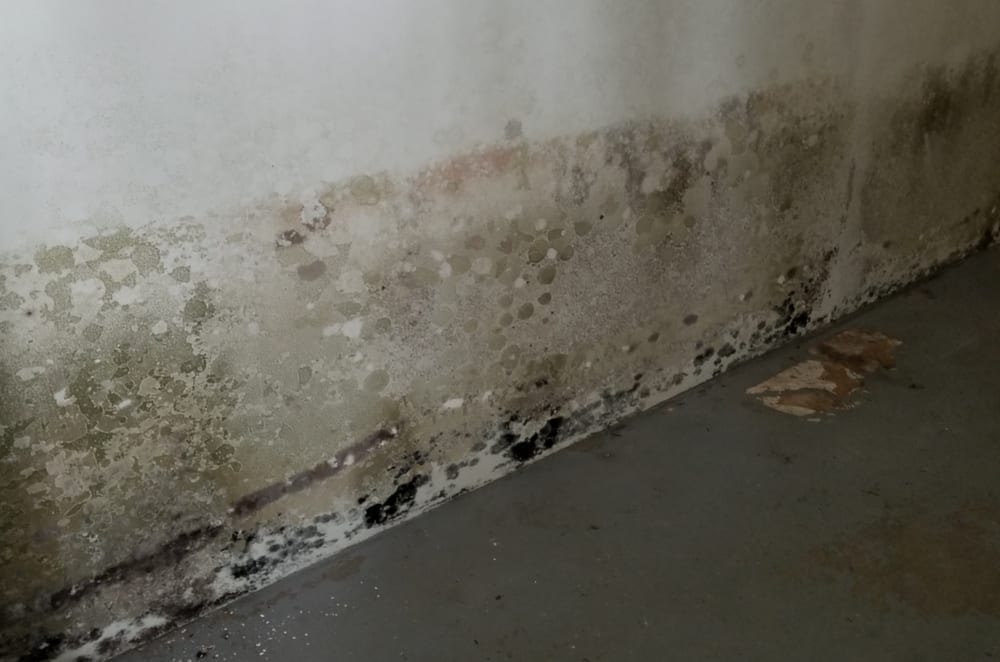The basement is one of the most common places for mold. Just a little bit of water can cause a big mold problem. We cover how to get rid of mold in a basement. Plus, we explain what it looks like, what causes it, and ways of preventing mold in your basement.
How To Get Rid of Mold in Your Basement
The only way to get rid of mold in a basement is to fix the water problem. Otherwise, it will always come back. You then need to clean and disinfect the area. You can safely kill basement mold if it is less than a few square feet. However, you should hire a mold remediation company for larger spaces.
1. Fix the Water Problem
Mold is always caused by a water problem. If you don’t repair that first, the mold will come back in weeks or even days. Usually, you need to fix a leaky pipe or clean out clogged drains, but you may need to waterproof your foundation.
2. Throw Away Damaged Materials
Next, throw away anything that is damaged or covered in mold. Use heavy-duty garbage bags, or you can spread mold throughout your home during cleanup.
3. Dry Your Basement
Even a little water will allow the basement mold to grow, so make sure your dry your basement thoroughly. High-volume fans and drying dehumidifiers are the best tools for drying your basement.
4. Clean and Disinfect
Once your basement is dry, you need to kill any remaining mold. Add one cup of bleach to a gallon of warm water, then spray down anything with mold. While bleach is safe, the smell can be overpowering. We recommend wearing safety glasses, rubber gloves, and a face mask.
What Are the Signs of Signs of Mold in Your Basement?
Seeing mold is an obvious sign you have a problem, but it can grow behind walls or underneath carpeting. If you don’t see mold but think you have a problem, look for these signs of basement mold.
- Musty odors that get worse after rainstorms
- Chipped or peeling paint or wallpaper
- High levels of humidity or condensation
- Visible water leaks, pools of water, or water stains
- Crumbing walls or building materials
- Stains on walls, carpeting, flooring, or other items
- Sudden or worsening allergies or respiratory conditions
Where Will You Find Basement Mold?
Although it can grow anywhere, you will usually find basement mold in these places:
- Laundry Room – Because of the water supply line and drains, the laundry room is perfect for mold. Plus, mold will grow around your drain, on lint, or even wet clothing.
- Around Appliances – Your furnace and air conditioner both create a small amount of water. If the water leaks, it can lead to mold.
- Along Foundation Walls – Your foundation walls normally block water, but over time they can crack or leak. Even a small leak can cause mold behind drywall or under carpeting.
- Anywhere With Clutter – Basements are great for storage, but that clutter can cause problems. Putting things on the floor will help retain water and let mold grow.
What Does Basement Mold Look Like?
Basement mold looks like a black or green stain and usually forms a blotchy pattern. However, the colors can vary widely, including brown, blue, yellow, and pink. The area can also look dingy or wet. Some basement molds are fuzzy, but most are smooth or even slimy.
How To Prevent Mold in Your Basement
The best way to prevent mold in the basement is to check for leaks regularly. Since many basements have water problems, it’s also important to clean your basement often and disinfect it at least once a year.
Check for Water Leaks
You can help prevent basement mold by checking your pipes and appliances every month or two for leaks. Start at your water shut-off valve and follow your water pipes until they disappear into the floor. Then look around your hot water tank, furnace, air conditioner, washing machine, and dry. Check connection hoses and drain pipes as well. If you have a finished basement, look for water stains or soft, spongy spots on your walls.
Address Moisture Issues Immediately
Many basements have high humidity levels, so use a dehumidifier to help regular the moisture levels. If you have a basement bathroom, use an exhaust fan to help condensation. Clean up spills immediately and never leave water pooling on the basement floor.
Clean Regularly
While water causes basement mold, it is more likely in a dirty basement. Make sure you clean with soap and water every other month and disinfect with bleach every year. Take out the trash regularly as well.
Store Things Properly
Since boxes can soak up water and lead to mold, you should use water-tight storage containers to limit problems. Also, put them on metal or plastic shelves to keep them off the floor.
Have Your Home Waterproofed
If your basement walls are cracked or have water stains, you should waterproof your foundation to prevent leaks. While exterior waterproofing is the most effective, you can also waterproof your basement from the inside.
Frequently Asked Questions About Basement Mold
What Causes Basement Mold?
Basement mold is caused by water. Mold is nature’s recycling bin, and it can grow on almost anything in your basement as long as there is water.
How Common Is Mold in the Basement?
Basements are one of the most common places in your home for mold. Not only is the temperature, humidity, and light level right, but nearly all of your water systems run through the basement as well. Just a small amount of water will allow mold to thrive.
Worried about basement mold? Call 1-888-681-1071 for a free estimate on mold removal services near you.





